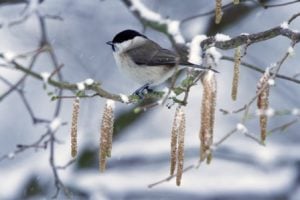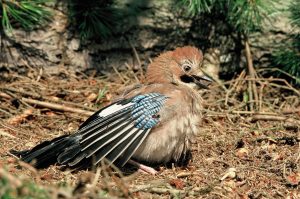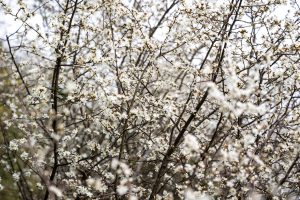Is your garden wildlife-ready for winter?
With most of the leaves now off the trees and with a cold snap this week, it’s a reminder that autumn will soon move aside for the long winter months.
This means, of course, that we all start to think about our own lives and practical things - such as what we wear outside and ensuring the heating boiler has been serviced. But how about your garden with all the birds and other wildlife in it? Here we set out some advice and tips on also getting your garden ready for its visitors and inhabitants for the winter ahead.
Many people now feed at least some suet products to their garden birds all year round, but if you don’t then now is definitely the time to put some out. If you haven’t fed suet before then the choice of products we have available might seem a bit overwhelming, so if that is the case then our recommendation would be Super Suet Fat Balls fed from a Fat Ball Feeder Ring - reasons being:
If you want to go a step further, then Suet Pellets fed from a ground feeder will ensure larger ground feeders such as blackbirds also get a share. The UK’s population of blackbirds increases during the autumn and winter months with an influx of birds migrating to our shores from Norther Europe, so we need to look after them!
It’s a job none of us enjoy, but anyway if you haven’t done it recently then now is a good time to get your feeders really clean – and, on the plus side, if you do it now then you won’t have to do it on a freezing day in December or January. We’ve a great range of hygiene products to help you.
We might tend to think that the warm summer months are when birds need easy access to clean water for bathing and drinking, but actually it’s just as important in the winter months – in fact more so if a natural supply of water, such as pond, is frozen over. So a bird bath kept full with clean water is essential for any wildlife-friendly garden, which will of course need defrosting in freezing conditions - a kettle of water just off the boil or float a tennis ball will do the trick.
Let’s also not forget the small mammals, invertebrates and amphibians – the latter which will be hibernating, plus many species of invertebrate will be as well. Perhaps you already have habitat piles (essentially, a stack of logs, branches twigs and dead vegetation all piled up) in your garden, but even if you have them adding fallen leaves to them further improves insulation. If you don’t already have at least one habitat pile, then now if good time to create one – not least as it gives you a very useful place to dump all of those fallen leaves!
This means, of course, that we all start to think about our own lives and practical things - such as what we wear outside and ensuring the heating boiler has been serviced. But how about your garden with all the birds and other wildlife in it? Here we set out some advice and tips on also getting your garden ready for its visitors and inhabitants for the winter ahead.
Bird food selection – it really should include suet
Many people now feed at least some suet products to their garden birds all year round, but if you don’t then now is definitely the time to put some out. If you haven’t fed suet before then the choice of products we have available might seem a bit overwhelming, so if that is the case then our recommendation would be Super Suet Fat Balls fed from a Fat Ball Feeder Ring - reasons being:
- Our Super Suet Fat Balls contain 50% more fat that our standard Suet Fat Balls, which means that birds don’t have to work so hard or eat as much to get their all-important fat intake – which is essential for energy and keeping warm.
- The circular shape of the Fat Ball Feeder Ring means that along with all the species of tit, smaller ground feeding birds such as robins and even blackbirds can also use it, and simply because they’re able to stand on the inside lower part of the circle – something they can’t do with a normal tube-shape feeder.
If you want to go a step further, then Suet Pellets fed from a ground feeder will ensure larger ground feeders such as blackbirds also get a share. The UK’s population of blackbirds increases during the autumn and winter months with an influx of birds migrating to our shores from Norther Europe, so we need to look after them!
Bird feeders need to be cleaned (however much we don't enjoy doing it)
It’s a job none of us enjoy, but anyway if you haven’t done it recently then now is a good time to get your feeders really clean – and, on the plus side, if you do it now then you won’t have to do it on a freezing day in December or January. We’ve a great range of hygiene products to help you.
Birds still need clean water in the winter months
We might tend to think that the warm summer months are when birds need easy access to clean water for bathing and drinking, but actually it’s just as important in the winter months – in fact more so if a natural supply of water, such as pond, is frozen over. So a bird bath kept full with clean water is essential for any wildlife-friendly garden, which will of course need defrosting in freezing conditions - a kettle of water just off the boil or float a tennis ball will do the trick.
All those leaves and what to do with them
Let’s also not forget the small mammals, invertebrates and amphibians – the latter which will be hibernating, plus many species of invertebrate will be as well. Perhaps you already have habitat piles (essentially, a stack of logs, branches twigs and dead vegetation all piled up) in your garden, but even if you have them adding fallen leaves to them further improves insulation. If you don’t already have at least one habitat pile, then now if good time to create one – not least as it gives you a very useful place to dump all of those fallen leaves!



